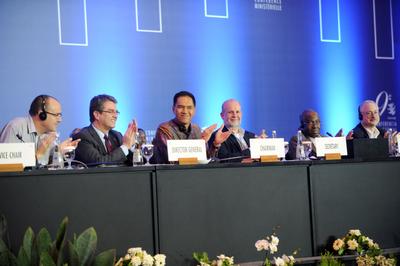Several reasons make the revival of multilateral negotiations imperative. First, the WTO has some bicycle-like qualities. If it doesn’t move forward, it can falter. Populist and interest group opposition to WTO disciplines create an ongoing risk of eroding political support and disuse. The WTO’s dispute resolution mechanisms have been essential to continuation of the successful trade regime, with huge attendant benefits to global economic growth. Without them, trade disputes would fester, escalate, and impede global economic progress. Behind the WTO’s ongoing success is the continually demonstrated unity of world leaders, and particularly top world leaders, in supporting it. We must keep the bicycle moving.
Second, the principal current proposals for regional agreements exclude China. TPP (the principal trans-Pacific proposal), and TTIP (the principal trans-Atlantic proposal) both exclude China. TIS (Trade in Services) negotiations may or may not welcome China. While there may be virtues in having some agreements that agree upon standards China is not ready for, if the principal columns of global trade architecture exclude China, then that architecture is doomed.
China is just too big and too globally connected. The extraordinary adjustments China has made in response to an exceptionally demanding WTO agreement, and the positive global economic results of that agreement, refute the idea that China deserves to be excluded. The US has been unwise in promoting a new global trade architecture without making a determined effort to upgrade China’s role too. A renewed effort on Doha, together with a door clearly open for China to join a high quality TPP, would demonstrate that the US remains open to an architecture that includes an appropriate role for China.
Critically, excluding key countries like China disrupts supply chains. For instance, many multinational corporations have been moving parts of their supply chains from China to Vietnam. But President Obama has personally focused on an effort to ensure that TPP will include rules of origin that exclude Vietnamese textile exporters from using Chinese thread. Many American companies will be among those disadvantaged. More broadly, the result of such an approach is what Joanne Shelton, a leading US trade expert, has called ‘a noodle bowl on top of a spaghetti bowl’.
Third, the US puts itself at risk in promoting a new global architecture that excludes China. Fairly or unfairly, the US proposals are universally understood in Asia as being intended to isolate China. But if the US Congress refuses to give President Obama Trade Promotion Authority, TPP may fail. What will happen then?
China has already signed far-reaching agreements with ASEAN. It will push, probably successfully, for similar agreements with Central Asia. China already has FTAs with Singapore, New Zealand, Pakistan, Chile, Peru, Costa Rica, Iceland and Switzerland. It is negotiating FTAs with the Gulf Cooperation Council, Australia and Norway; discussing a China–South Korea FTA and a China–Japan–South Korea FTA; and promoting RCEP (Regional Comprehensive Economic Partnership) with ASEAN plus Australia, India, Japan, South Korea and New Zealand, that would include half the world’s population. If the US continues to be seen as trying to isolate China, then China might add a deal with Europe, conceivably with enough success to leave the US as the isolated party.
The principal objection to any increased effort to move Doha forward is that the required unanimity is exceedingly difficult to obtain. Some key countries consistently oppose upgraded trade agreements due to domestic politics even though their leaders know their countries would benefit. The world may need to consider modification of the rule of unanimity, or other countries may need to find additional ways to pressure key countries that consistently oppose upgrading. Alternative strategies would be to find a path to incremental progress, building on Bali, or to declare victory on Doha and chart a re-configured path in a new round.
Whatever it takes, the world needs to revive multilateralism. Multilateralism heightens growth. It reduces inequality because it helps smaller enterprises reduce their transaction costs to do global-scale business. The proposed regional agreements need to become part of a solid, prosperous global architecture. All countries will then be able to take full advantage of one of the most positive developments in world economic history: whereas advanced-country labour markets have been weighed down the past two decades by the addition of a billion new workers to the international labour pool, through the openings of China and Soviet Europe, the next two decades will be defined by the fact that those new workers have become a billion increasingly prosperous consumers. This is the key to a new era of global prosperity.
If we do not revive multilateralism, the new TPP/TIPP/TIS architecture will at best enhance balkanisation or at worst collapse.
William H. Overholt is President-elect of the Fung Global Institute and a Senior Fellow at Harvard’s Asia Center. The views here are his own, not endorsed by his employers.

